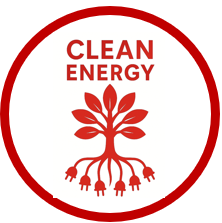Overview
The Washington State Fire Marshal’s Office has established a dedicated section focused on researching emerging clean energy technologies in Washington State. This program provides information, training, and resources to stakeholders on current best practices for managing clean energy incidents.
Currently funded for two years, the program’s goal is to meet the needs of jurisdictions across the state while building a foundation for permanent establishment.
Disclaimer: This is an evolving field, with new research coming out almost daily. Listed Recommendations are subject to change.

The Problem
The rapid adoption of clean energy solutions in Washington—such as solar photovoltaic systems (PV), lithium-ion battery storage, and hydrogen fuel cells—has introduced new hazards that impact both responder and public safety. These complex risks require specialized knowledge, updated practices, and coordinated response strategies.
Program Goal
The Clean Energy Research & Training Unit aims to:
• Improve emergency response capabilities
• Enhance public safety across Washington State
• Identify and address complex hazards associated with alternative energy technologies
This will be accomplished through:
• Development of evidence-based safety guidelines
• Targeted training programs for responders
• Policy recommendations supporting safe integration of clean energy technologies
EV Fire Safety
All vehicles carry some fire risk. While EV fires receive media attention, they remain rare and occur less frequently than fires in gasoline-powered vehicles.
EV fires most often result from battery damage during serious collisions. Prevention includes safe driving practices—adhering to speed limits, avoiding aggressive maneuvers, and staying alert.
When installing a home charger, always use a certified electrician to inspect your electrical system and properly install the equipment.
Thermal runaway occurs when a battery cell short-circuits and heats uncontrollably. As heat spreads between cells in a module, it can trigger a chain reaction where heat generation becomes self-sustaining.
• Recommended practice: NFPA advises using water to extinguish EV fires.
• Key clarification: Lithium-ion EV batteries contain lithium salts, not pure lithium metal, making them safe to cool with water.
• Tactics: Water is applied to cool the battery casing, stopping thermal runaway.
NFPA offers specialized training for fire service personnel. More information can be found here.
Solar Panel Safety
When installed by a qualified vendor, rooftop PV systems should not introduce significant additional risk.
Fires directly caused by PV systems are rare. More commonly, fires originate inside the home and spread to the roof.
PV systems should include clear labeling that identifies connections and components for quick access during emergencies.
• Follow National Electric Code requirements for safe distances from live electrical parts
• Use caution, as PV modules can create slippery roof surfaces
• Engage in scenario-based training to prepare for safe operations
The Interstate Renewable Energy Council (IREC) provides free online courses and live workshops for firefighters, funded through the U.S. Department of Energy’s Solar Energy Technologies Office (SETO). Training helps responders safely navigate PV-related fire incidents.
Resources and Training
Firefighters, emergency responders, and stakeholders can access additional resources and training through:
• NFPA Training & Guidance– Courses and materials on EV and alternative fuel vehicle fire response. Access NFPA Training here.
• IREC Training for Firefighters– Free, self-paced online courses and live workshops on PV safety. Access IREC Training here.
• U.S. Department of Energy (SETO)– National initiatives supporting solar safety and workforce readiness. Learn more here.
• Washington State Fire Marshal’s Office (WSFMO)– Local resources, research updates, and program information. Visit WSFMO here.
• EPA Lithium-Ion Battery Emergency Response Training– EPA Lithium Battery two day training. Access EPA Lithium Battery two day training here.
Contacts
Chief Deputy State Fire Marshal
Dylan Montgomery
Email: Dylan.Montgomery2@wsp.wa.gov
Phone: (360) 995-2378
Deputy State Fire Marshal
Dr. Sean Thompson
Email: Sean.Thompson@wsp.wa.gov
Phone: (509) 960-0438
Deputy State Fire Marshal
Scott Lancaster
Email: Scott.Lancaster@wsp.wa.gov
Phone: (360) 870-0762
